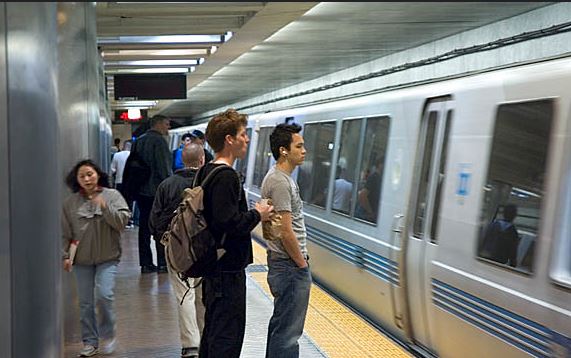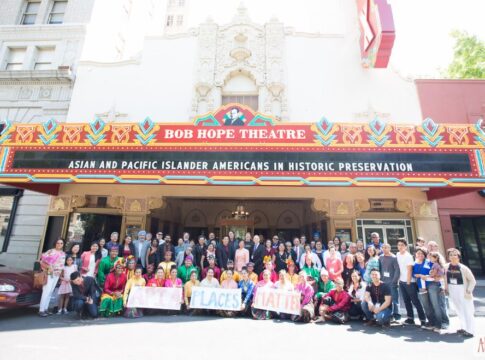By Renee Wang, AsAmNews Intern
Despite multiple empty seats, a man chooses to sit next to UC Berkeley alumna and spoken word poet Riss Myung. When she gets off at downtown Berkeley, the man begins following right after her. Myung ran to safety.
In the second instance, a different man sits next to Myung despite multiple empty seats and begins to put his hand on her thigh. When Myung objects, stammering, the man dismisses her — “come on, China baby doll” he says.
Myung also recalls another person approaching her while she was taking the BART and asking her how much she charged for oral sex.
Her experiences reflect a larger pattern of harassment that the Stop AAPI Hate Coalition has been tracking through its online reporting platform. According to Annie Lee, Director of Policy for Chinese for Affirmative Action, the coalition noticed four alarming data trends. Over 4100 hate incidents reported came from California. Two-thirds of hate incidents were reported by women. 75% of these incidents occurred in public spaces — such as transit and business. Lastly, the vast majority of hate incidents reported were not crimes. These incidents do not fit into a criminal context, Lee says, as the vast majority of these incidents are verbal harassment which law enforcement does not respond to.
LATEST STORIES
“The combination of these four data trends made us focus on a package [of policy initiatives] that we are calling No Place for Hate,” Lee said. “This takes a public health and civil rights approach, because the data shows us that most of these incidents are not criminal, so you can’t solve it through the criminal justice system. Instead, many of these things are public health problems: the way we treat each other in public has an impact on our health. It changes our behavior and ability to access and move in public spaces. We want to reframe the culture of street harassment.”
The No Place for Hate agenda is a trio of policy solutions that aims to reframe street harassment as a public health issue. SB 1161, Increasing Safety for Public Transit Riders, is authored by Sen. Dave Min calls upon the top 10 transit agencies in California to collect demographic data about their riders and identify solutions to address street harassment in the public transit system, according to Lee. AB 2448, Expanding Civil Rights Protections at Businesses authored by Assembly member Phil Ting calls upon large businesses to protect customers from bias-related harassment. AB 2549, Street Harassment Prevention, would mandate street harassment as a public health issue in California and is authored by Assembly members Mia Bonta, Akilah Weber, and Al Muratsuchi.
As one of the two Asian American representatives in the California state senate, Min says that the issue of anti-Asian hate is something he deals with daily, having been called racial slurs and subject to microaggressions. While he does not experience street harassment, he notes that his constituents do — and for the last couple of years, Min has been determined to come up with a solution to make public spaces safer. According to Sen. Min, while the core of SB 1161 deals with anti-Asian hate, it applies to many marginalized communities as well.
“Lower-income households are more likely to take public transportation — [this is an] intersectional issue — women, minorities, seniors, and individuals with disabilities are often subject to harassment or worse,” Min said. “Public transit is a lifeline to get to places, to work, and to survive. This is an issue of equity in ensuring public transit is safe [and creating a] sense of autonomy and confidence to get to jobs, get home, and see their loved ones safely.”

For Myung, who does not own a car, public transit is her lifeline: she takes the BART to work, and the bus to see her friends. However, compared to her male friends who can sleep in between destinations, Myung’s commute is drastically different — as an Asian American woman taking public transit, Myung has experienced several instances of sexual and verbal harassment. These instances signified to Myung how young women and other vulnerable populations are simply not protected in public spaces and are often subject to racialized and sexualized treatment.
On her commute, Myung carries the following items to feel safe: a pepper spray on her lanyard, a device with sharp ends and a flashlight, for when it is dark outside. In addition to carrying safety devices, her guard is constantly up — “I feel like I can’t relax,” Myung says. “The worst-case scenario is always on the back of my mind.
“It’s not fair how much money women have to go out of their way to be comfortable. It costs money to get all these devices, and it costs a lot of time in terms of emotions. It’s normalized [for women] to go out of our way to compartmentalize the lack of safety measures we do in our daily lives to keep ourselves safe. But all these [measures] put an onus on the individual and not the system responsible for the change.”
SB 1161 has passed in the senate and is now in the assembly. AB 2448 has passed the assembly floor and is now in the senate. AB 2549 did not pass through the committee; however, Stop AAPI Hate and the California Healthy Nail Salon Collaborative have submitted a budget proposal to the legislature, requesting funding to research preventative public education solutions.
AsAmNews has Asian America in its heart. We’re an all-volunteer effort of dedicated staff and interns. Check out our new Instagram account. Go to our Twitter feed and Facebook page for more content. Please consider interning, joining our staff, or submitting a story, or making a financial contribution.








